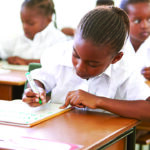
Mastercard Foundation in partnership with Co-Creation Hub has advised educators on the use of technology to improve learning among disadvantaged children and those with disabilities.
A statement attributed to the July edition of EdTech Mondays said that with the growing interest in the adoption of technology in Nigeria’s education sector, the use of technology for teaching and learning undoubtedly proved to be an enabler of equitable education for persons with disabilities, learners from disadvantaged backgrounds, learners living in rural locations, and women and girls of marginalised groups.
Speaking during the session titled, ‘Technology as an enabler for equity and inclusion in education,’ Assistant Education Officer, United Nations High Commission for Refugees, Helen Akintemi, stated that the organisation viewed technology as a veritable tool to drive inclusion in education among refugees.
Akintemi stated that UNHCR, a non-governmental organisation, had been at the forefront of safeguarding the education rights and well-being of refugees and internally displaced people in Nigeria through technology deployment.
While highlighting some of the challenges faced in deploying technology for children with disabilities, Also speaking, Founder, Keeping it Real Foundation, Bitebo Gogo, urged stakeholders to work more in improving advocacy against stereotypes while also solving the problem of internet connectivity and power plaguing the country.
Speaking at the panel session, Kayode Alabi, the founder of Kayode Alabi Leadership and Career Initiative, noted that the organisation had been leveraging technology to enhance learning among children with disabilities and their teachers.
Alabi pointed out that the foundation had so far impacted over 6,500 children in underserved communities in Nigeria by helping them acquire 21st-century skills and other life skills.





